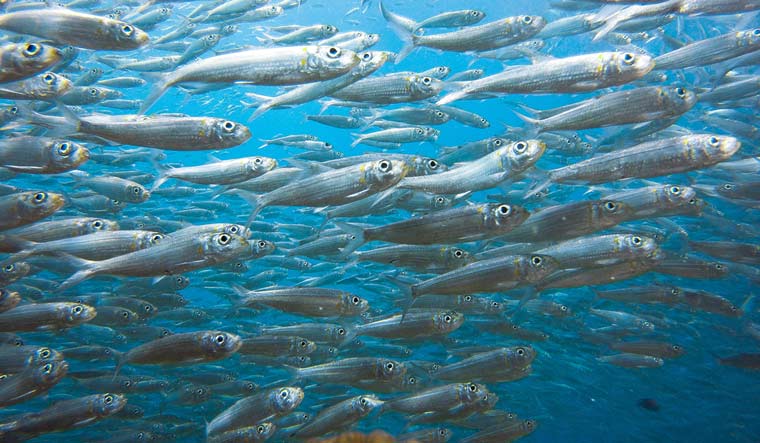
Experts working in the areas of climate change, oceanography, fishery biology and socio-economics in the country would gather at the Central Marine Fisheries Research Institute (CMFRI) in Kochi on Tuesday to analyse the reasons for the fluctuating existence of oil sardine in the southern Arabian sea.
Experts from different research institutes in the country would engage in a panel discussion to set a way for the future course of research on fluctuating trend of oil sardine on a multi-disciplinary platform. The meet aims to recognise micro-level ecological factors of the ocean that influence the biological cycle of oil sardine, said E M Abdussamad, principal scientist of the CMFRI.
The national-level symposium would try to identify the factors affecting this marine species along the south-west coasts and find ways and means to address the issue, said a statement released by CMFRI.
Abdussamad said recent investigation of the CMFRI had indicated that climate change, especially El Nino-La Nina episodes, has a significant impact on the oil sardine landing.
Based on this, CMFRI had issued an advisory that availability of sardine from Kerala coasts this year would decrease drastically depending on the intensity of El Nino.
Indian oil sardine (scientific name: Sardinella longiceps) is available on the entire west coast of India from Gujarat to Kerala, and also found in the Indian east coast, but coasts of Kerala and Karnataka account for major catches in India.
Data released by CMFRI show that oil sardine catches have drastically declined in the country. The sardine resource is highly susceptible to frequent and heavy fluctuations, but specific causative agents for this remain an enigma to the researchers, fishermen and managers, he said, adding that the discussion on a multi-disciplinary approach would lead to a better understanding of the reasons behind the situation.
Apart from El Nino, various unfavourable environmental conditions and oceanographic phenomena such as increase in the sea surface temperature, upwelling and fluctuations in ocean productivity are considered crucial factors affecting the life-cycle of oil sardine. Overfishing has also led resource depletion all along the coast.
However, micro-level analysis is required to identify how various oceanographic and climatic parameters affect the biology of the fish, Abdussamad said. A multi-disciplinary approach is essential to analyse these aspects to generate a refined view on this enigmatic fish species
The national-level meet would also set a platform to improve collaboration among research organisations in the marine fisheries and environment monitoring.
Besides the scientists from CMFRI, researchers from National Institute of Oceanography, Indian National Centre for Ocean Information Services, Space Applications Centre of ISRO, Indian Institute of Tropical Meteorology and Central Institute of Fisheries Technology would attend the meet.

No comments:
Post a Comment